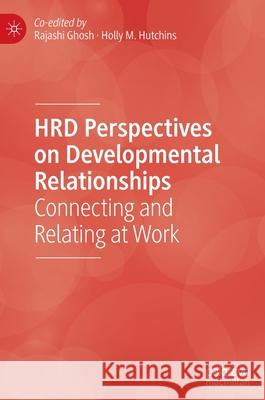Hrd Perspectives on Developmental Relationships: Connecting and Relating at Work » książka



Hrd Perspectives on Developmental Relationships: Connecting and Relating at Work
ISBN-13: 9783030850326 / Angielski / Twarda / 2022 / 564 str.
Hrd Perspectives on Developmental Relationships: Connecting and Relating at Work
ISBN-13: 9783030850326 / Angielski / Twarda / 2022 / 564 str.
(netto: 651,74 VAT: 5%)
Najniższa cena z 30 dni: 655,41
ok. 16-18 dni roboczych.
Darmowa dostawa!
OPENING: Chapter 1: Together is better: Situating Developmental Relationships within HRD Research and Practice – Holly M. Hutchins & Rajashi Ghosh
PART 1: Talent Development: Learning & Performance Perspectives
Chapter 2: Using Developmental Relationships to Navigate Career Transitions: Implications for Diverse Populations – Tomika W. Greer & Sarah E. Minnis
Chapter 3: Making the connection between Developmental Relationships and Employee Engagement - Mandolen Mull, Clayton Duffy & Brad Shuck
Chapter 4: Coaching the Imposter: Developing Emerging Leaders as they Negotiate Identity and Imposter Concerns – Angie D. Carter, Cynthia M. Sims, Holly M. Hutchins, & Maurice Williams, Jr.
PART 2: Knowledge Management & OD Perspectives
Chapter 5: Leaders Fostering Dialogue through Developmental Relationships: An OD Perspective – Rod Patrick Githens and Nileen Verbeten
Chapter 6: Inter-generational Developmental Network and the Impact of Technology on Knowledge Creation and Sharing – Sanghamitra Chaudhuri, Seung Won Yoon, Marcia Hagen, Agnés Legrand
Chapter 7: The Power of Embedded Developmental Relationships:
Examining Interdependencies among Informal Learning, Developmental Coaching Relationships, and Organizational Culture - Pierre Faller, Victoria J. Marsick & Karen E. Watkins
PART 3: Inclusion and Social Justice Perspectives
Chapter 8: Mentoring Diverse Leaders: The Necessity of Identity Work – Audrey J. Murrell & Gloria Onosu
Chapter 9: Using feminist mentoring to deconstruct privilege and power in developmental relationships: A narrative inquiry - Ague Mae Manongsong and Joshua C. Collins
Chapter 10: Employee Resource Groups: Enabling Developmental Relationships to Support Socially Just and Morally Inclusive Organizations- Marilyn Y. Byrd
PART 4: Online and Virtual Relating Perspectives
Chapter 11: Can You Hear Me Now?” Technical and Human Factors in Virtual Developmental Relationships - Laura L. Bierema
Chapter 12: Using Developmental Relationships to foster Trust in Effective Virtual Teams:
Lessons in Emergency Preparedness from the COVID-19 Pandemic – Marie-Line Germain & David McGuire
Chapter 13: Blurring of Boundaries between Work and Home: The Role of Developmental Relationships in the Future of Work – Roland K. Yeo & Jessica Li
PART 5: Globalization and National Capacity Building Perspectives
Chapter 14: Successful Expatriation and Repatriation for both Employers and Assignees: A Developmental Network Perspectives - Yan Shen & Najung Kim
Chapter 15: Cross-Cultural Styles of Relating and Connecting in Developmental Relationships – Consuelo Waight & Toby Egan
Chapter 16: How Developmental Relationships Can Be Used by Organizations and Governments as Tools for National HRD Initiatives: India and Spain- Ashutosh Muduli, Aitana Gonzalez, Gary N. McLean
PART 6: Evaluation and Assessment Perspectives
Chapter 17: Assessing the Impact of Developmental Relationships in a Humanitarian Context - Julie Haddock-Milar, Chandana Sanyal, Neil Kaye & Holly Bennett
Chapter 18: Needs Assessment in Assessing, Building, and Supporting Developmental Relationships in Organizations – Darlene Russ-Eft
Chapter 19: Seeking support from multiple Developers: Assessing optimal structure, content, antecedents, and outcomes of Developmental Networks- Rajashi Ghosh, Wendy Murphy, Rick Cotton & Kathy Kram
CONCLUSION: Chapter 20- Connecting and Relating Through Developmental Relationships
-Andrea D. Ellinger & Wendy E. A. Ruona
Developmental relationships constitute interdependent, generative connections that promote growth and learning among individuals. While studies reporting the impact of developmental relationships on learning, performance, and career development leaves no doubt about its relevance to the human resource development (HRD) field, we lack an in-depth understanding of how developmental relationships apply to the myriad of topics relevant to contemporary HRD research and practice such as social justice, diversity and equity, leadership development, career transitions, knowledge sharing, organization development, employee engagement, organizational learning culture, globalization, national HRD, and technology at work.
1997-2026 DolnySlask.com Agencja Internetowa
KrainaKsiazek.PL - Księgarnia Internetowa









